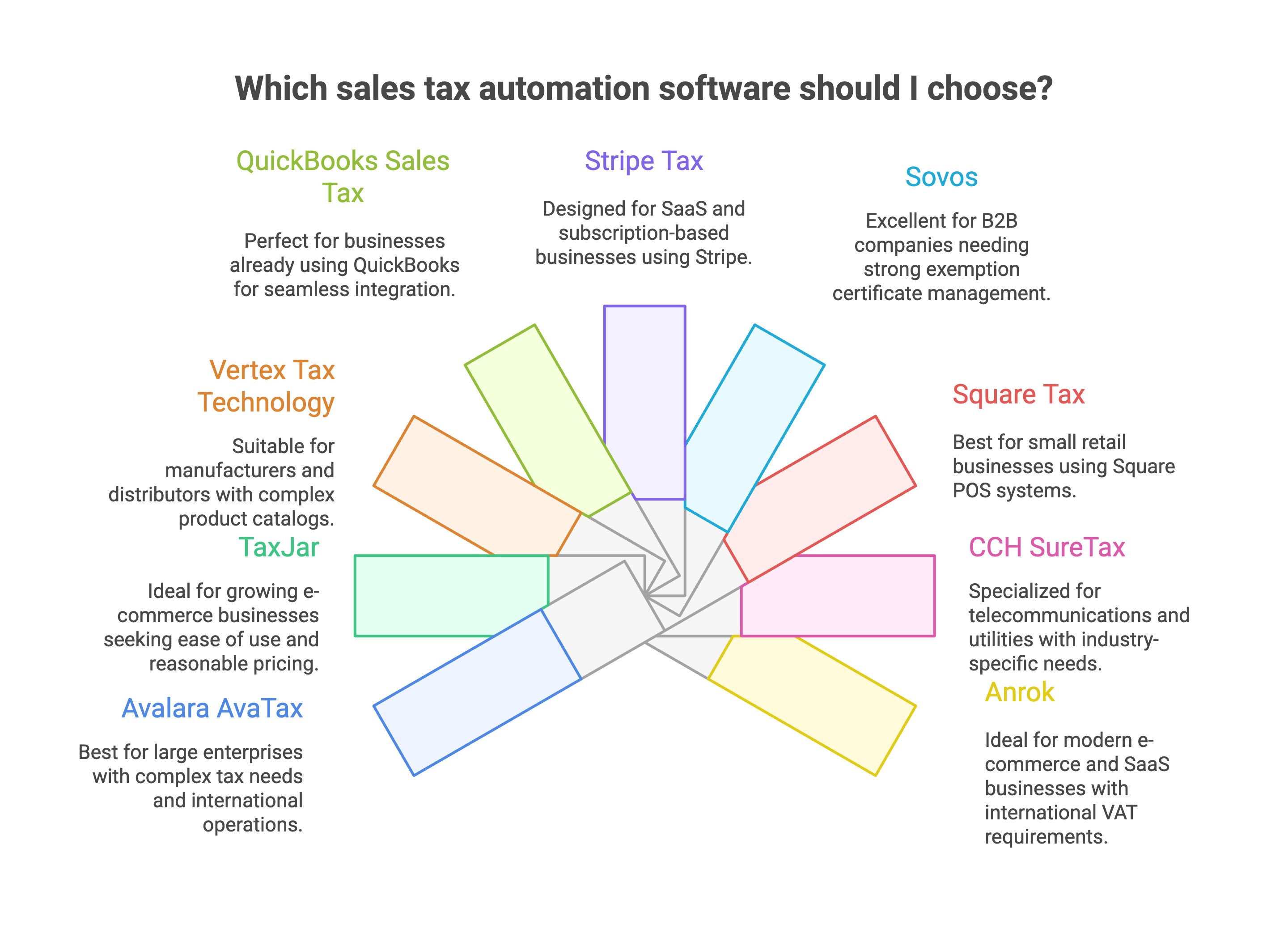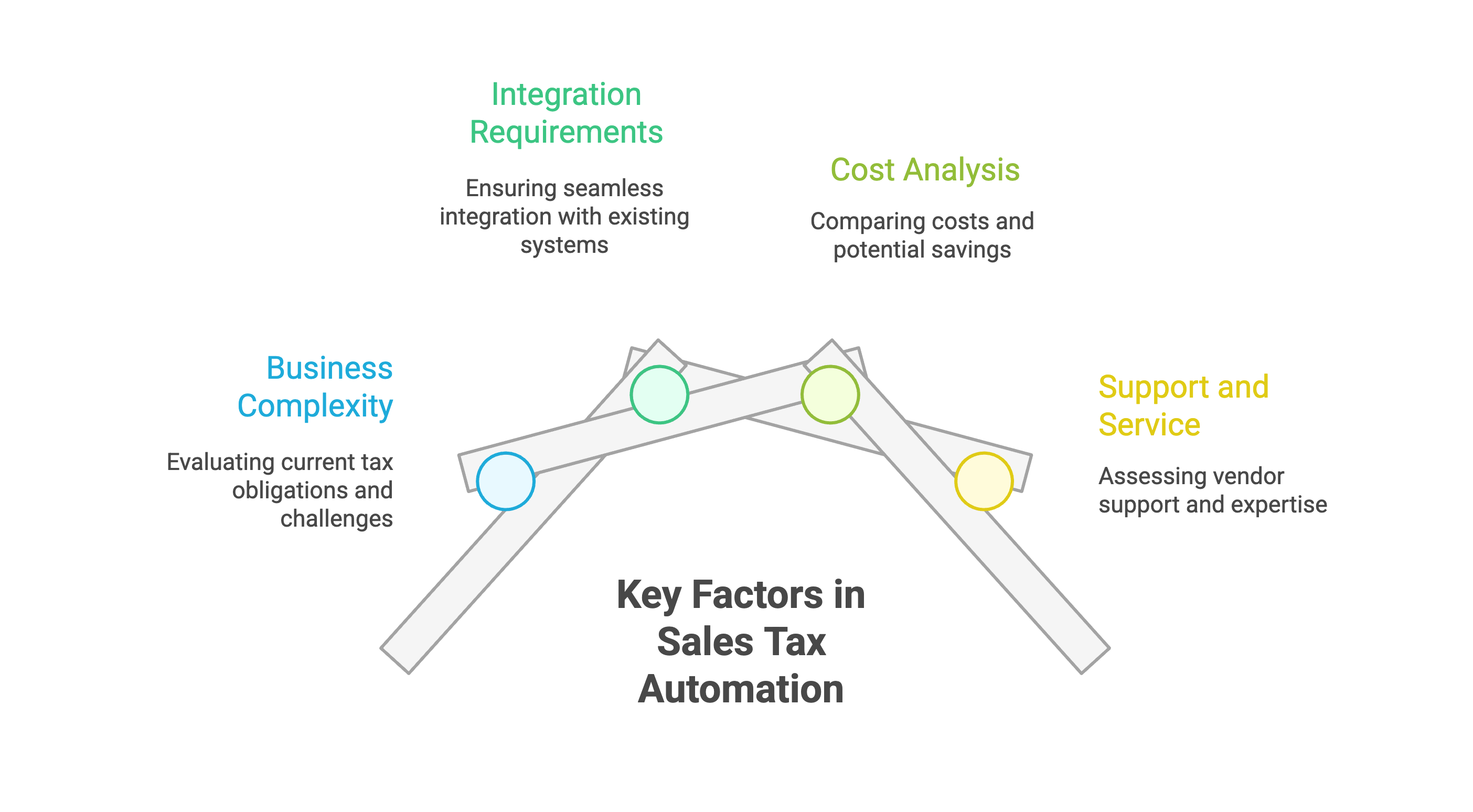Managing sales tax compliance manually feels like trying to juggle flaming torches while blindfolded. With thousands of tax jurisdictions across the United States, each with different rates, rules, and filing requirements, keeping up with sales tax obligations can consume countless hours and create significant compliance risks.
If you're spending too much time on tax calculations and worrying about getting something wrong, you're not alone. The good news is that sales tax automation software has evolved dramatically, making it easier than ever to automate these complex processes and focus on growing your business instead of drowning in tax compliance paperwork.
The complexity of US sales tax continues to grow as more states implement economic nexus laws and expand their digital tax requirements. What used to be manageable for small businesses has become a nightmare of constantly changing tax rates, varying exemption rules, and multiple filing deadlines.
Sales tax software solutions eliminate the manual calculations, reduce errors, and ensure you're always working with current tax rates and regulations. More importantly, they free up your time to focus on revenue-generating activities instead of spending hours on tax determination and compliance tasks.
The right sales tax automation platform doesn't just calculate taxes; it integrates with your existing systems, provides audit trails, handles exemption certificates, and can even file returns automatically. This level of automation transforms tax compliance from a burden into a seamless business process.
The foundation of any good tax automation software is accurate tax calculation across all jurisdictions where you have nexus. This includes not just state sales tax, but city, county, and special district taxes that can vary even within the same ZIP code.
Look for solutions that update tax rates in real-time and can handle complex tax scenarios like bundled products, digital goods, and services that may have different tax treatment across jurisdictions. The best systems maintain detailed audit trails showing exactly how each tax calculation was determined.
Your sales tax software should integrate seamlessly with your accounting software, e-commerce platforms, and other business systems. Manual data entry defeats the purpose of automation and creates opportunities for errors.
Modern tax automation platforms offer integrations with popular platforms like QuickBooks, Shopify, WooCommerce, Amazon, and dozens of other sales channels. The goal is creating a workflow where sales data automatically flows into the tax system without manual intervention.
Beyond calculations, the best sales tax compliance software can handle filing returns and making payments on your behalf. This feature eliminates missed deadlines and ensures consistent, accurate filings across all jurisdictions.
Some solutions offer different levels of filing automation, from preparing returns for your review to fully automated filing with minimal oversight required. Choose the level that matches your comfort level and internal control requirements.
What it is: The most comprehensive sales tax automation platform designed for complex, multi-jurisdictional businesses.
Strengths:
Limitations:
Best for: Mid to large enterprises with complex tax obligations, multiple sales channels, and international operations.
What it is: User-friendly sales tax automation focused on e-commerce businesses and growing companies.
Strengths:
Limitations:
Best for: Growing e-commerce businesses, mid-market companies with standard tax requirements, businesses seeking balance between features and ease of use.
What it is: Enterprise-grade tax engine with particular strength in manufacturing, retail, and distribution.
Strengths:
Limitations:
Best for: Large manufacturers, distributors, and retailers with complex product catalogs and B2B transaction volumes.
What it is: Native sales tax automation built into QuickBooks accounting software.
Strengths:
Limitations:
Best for: Small to medium businesses already using QuickBooks who want integrated tax automation without additional software complexity.
What it is: Tax automation designed specifically for software companies and subscription-based businesses.
Strengths:
Limitations:
Best for: SaaS companies, subscription businesses, and digital product sellers using Stripe for payment processing.
What it is: Comprehensive tax compliance platform with strong exemption certificate management capabilities.
Strengths:
Limitations:
Best for: B2B companies with significant tax-exempt sales, businesses with complex entity structures, companies requiring detailed audit trails.
What it is: Simple tax automation integrated with Square's point-of-sale and payment systems.
Strengths:
Limitations:
Best for: Small retail businesses, restaurants, and service providers using Square POS systems with straightforward tax needs.
What it is: Specialized tax determination platform focused on telecommunications, utilities, and digital services.
Strengths:
Limitations:
Best for: Telecommunications companies, utilities, digital service providers, and businesses with industry-specific tax requirements.
What it is: Modern sales tax platform designed specifically for high-growth e-commerce and SaaS businesses.
Strengths:
Limitations:
Best for: High-growth e-commerce businesses, modern SaaS companies, businesses with international sales requiring both sales tax and VAT compliance.

Start by evaluating your current sales tax obligations and compliance challenges. Consider factors like the number of states where you have nexus, types of products or services you sell, sales channels you use, and volume of transactions you process.
Small businesses with simple product lines selling primarily in one or two states have different needs than multi-state retailers with complex product catalogs. Understanding your complexity level helps narrow down solutions that provide appropriate functionality without unnecessary cost.
Evaluate how well potential solutions integrate with your existing technology stack. The best sales tax software becomes invisible to your daily operations by working seamlessly with systems you already use.
Consider both current integration needs and future requirements as your business grows. Solutions that offer robust APIs and extensive integration libraries provide more flexibility as your business evolves.
Compare not just subscription costs but also implementation expenses, integration costs, and potential savings from automation. Calculate the time currently spent on tax compliance and value that at appropriate hourly rates to understand potential returns.
Factor in risk reduction benefits as well. Automated systems reduce errors that could result in penalties, interest charges, or audit complications that can be far more expensive than software subscription costs.
Evaluate the level of support provided by different vendors, especially during implementation and when dealing with complex tax scenarios. Some solutions include tax expertise as part of their service, while others focus primarily on technology.
Consider whether you need dedicated account management, implementation support, or ongoing tax advisory services. These services can significantly impact your success with automation, particularly during initial setup and when facing unusual tax situations.

Successful implementation requires careful planning to ensure data accuracy and system reliability. Start by cleaning up your existing tax data and ensuring your product catalog has accurate tax classifications.
Test the new system thoroughly with historical data before going live. Most vendors provide sandbox environments where you can verify calculations and integrations without affecting live transactions.
Ensure your team understands how the new system works and how it changes existing workflows. Even automated systems require some oversight and occasional manual intervention for unusual scenarios.
Document new processes and create backup procedures for situations when automation isn't available. This preparation helps maintain compliance even during system maintenance or technical issues.
Regularly review system performance and accuracy, especially during the first few months after implementation. Monitor integration points to ensure data flows correctly and calculations remain accurate.
Stay informed about system updates and new features that could benefit your business. Tax automation software continues evolving rapidly, and staying current helps maximize your investment value.
How do I determine which sales tax automation software is best for my business?
Assess your business complexity, transaction volume, integration needs, and budget. Small businesses with simple needs might choose QuickBooks or Square Tax, while complex multi-state operations typically benefit from solutions like Avalara or TaxJar.
What's the typical cost range for sales tax automation software?
Costs vary widely from $20-50 monthly for basic solutions to $500-2000+ monthly for enterprise platforms. Most mid-market solutions range from $99-499 monthly, with pricing often based on transaction volume and features needed.
Can sales tax software handle exemption certificates and tax-exempt sales?
Yes, most quality solutions manage exemption certificates, validate exempt customer status, and apply appropriate tax treatment. Look for solutions offering automated certificate collection and validation for businesses with many exempt customers.
How accurate are automated tax calculations compared to manual processes?
Automated systems are typically far more accurate than manual calculations, especially for businesses operating in multiple jurisdictions. They eliminate computational errors and ensure current tax rates, though proper setup and configuration are essential.
What happens if there's an error in automated tax calculations?
Quality vendors provide audit trails showing calculation methodology and typically offer error resolution support. Many also provide compliance protection or will pay penalties resulting from system errors when properly configured and used.
How long does it take to implement sales tax automation software?
Implementation timelines range from days for simple solutions to several weeks for complex enterprise systems. Most mid-market solutions can be implemented within 2-4 weeks with proper planning and vendor support.
Do these solutions integrate with popular accounting and e-commerce platforms?
Yes, leading solutions offer extensive integrations with platforms like QuickBooks, Shopify, WooCommerce, Amazon, and hundreds of other business applications. Integration capability should be a key evaluation factor.
Can sales tax automation software file returns and make payments automatically?
Many solutions offer automated filing services, either preparing returns for your review or filing automatically based on your preferences. Some also handle payments, though you should evaluate security and control implications carefully.
Choosing the right sales tax automation software can transform your compliance burden into a seamless business process. The key is finding a solution that matches your business complexity, integrates well with existing systems, and provides the level of automation and support you need. With proper selection and implementation, you can eliminate the stress and time consumption of manual tax compliance while reducing errors and ensuring consistent accuracy across all your sales channels.

A practical comparison of hiring a freelancer vs using a dedicated offshore accounting team, focusing on continuity, quality control, security, and scaling.

How CPA firms outsource payroll and 1099 work to reduce penalties and admin load, with a clean workflow for approvals, filings, and year-end reporting.

Practical do's and don'ts for CPA firms outsourcing accounting work, based on common failure points and what successful rollouts do differently.